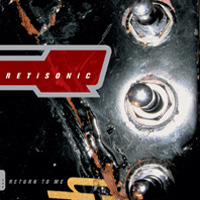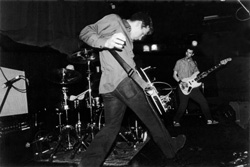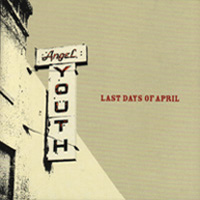 Retisonic
Retisonic
Return to Me (Silverthree)
An interview with guitarist/vocalist Jason Farrell
By Tim Den
On their first full-length, Retisonic further streamline their blend of manic post-punk energy, Cheap Trick-ish vocal hooks, and tightly-wound intrumental interplay. Whereas the debut EP, Lean Beat, wore its influences on its sleeves, Return to Me has stewed and simmered the sounds in a pot entirely the band’s own. The consistency is now homogenized, with each individual component no longer easily pinpointed. Retisonic have indeed become what guitarist/vocalist Jason Farrell set out to accomplish: A hybrid between the complex intelligence of the Dischord heritage and heady pop.
Lyrically, too, Return to Me straddles the line between accessibility and depth. By carefully selecting titles that are but fragments of the whole meaning, songs such as “Let Me Be,” “Why Don’t You Write,” and the title track lead you to believe that they are simple statements… before revealing themselves to be much more (as in “let me be… perfectly clear/I don’t think that we’re alike” and “why don’t you write… a checklist of entitlements for your life”). Double-meanings, purposefully exaggerated by leaving out halves of sentences, make for double/triple-takes when interpreting the lyrics. Not only are you provided with multiple possibilities of meanings, you are challenged (what a concept!) by the potential of smart rock lyrics. Fabulous.
In an ideal world, rock creations of this craftsmanship – musically, technically, lyrically – would be gawked at in awe by the communities from which they were spawned. Punkers would rage to it, popsters would singalong, and writers would hold classes on Retisonic’s prose.
First of all, let’s talk about your move from DC (where Farrell’s old bands, Swiz and Bluetip, were based) to NY.
I moved up to NY in ’99. My girlfriend at the time got a cheap apartment in New York and a good opportunity to get out of DC. I was spending half the week in New York and half the week in DC, coming back down for practice with Bluetip. Finally, I was like “At this point in my life, it doesn’t matter where I live. And I like New York. And I want to live with my girlfriend.” (laughs) So I moved. Bluetip wasn’t finished yet, but we were finishing up our last album and some tours. Right around that time, I started segueing everything into what would become Retisonic.
 Was it obvious to Bluetip, at the end, that “this was it”?
Was it obvious to Bluetip, at the end, that “this was it”?
Sort of. We had a lot of member changes. Many, honestly, didn’t make a difference at all. Nothing against them personally, but it didn’t slow the band’s momentum in any way. Unlike losing Dave Stern (guitarist). That was hard, but we were like “Okay, let’s keep going.” The thing that really signaled the end of the band was when we lost Dave Bryson (now in Canyon). He was our sixth drummer, but had been on two albums and the most tours. Most time with us, most creative imput: He was a huge part of the band. Our last album had just come out, and we thought “Well, we still need to tour. We still like these songs and we don’t want them to just sit.” So we did one more U.S. tour and one more European tour with Areif (Sless-Kitain) on drums.
But at that point, we were like “We’ve been doing this a long time. It’s been great, but little has changed. We’re playing the same venues as when the band started.” We started to look at the music and realized we were making it more difficult than it needed to be. Not only sonically, but forcing listeners to weed through too much information. Also, for us, wasting live energy: Putting in 100%, but having it dissipate. Like a random firing of events.
On a recording, in a controlled environment, you can make these layers of riffs, the way guitars play off of each other. We started to notice that, in most of the places we play, it turns into a wall of static.
As Bluetip was winding down, I was like (very assertively) “I’m starting a new band, and it’s called Retisonic. These are the songs, let’s record them.” I already had a demo before we shut the door on Bluetip.
What made you want to start over with Retisonic – having to build everything from the ground up again – when you’d already suffered through the obstacles with Bluetip?
Well, being afraid to make that decision was what dragged Bluetip on. Jake (bassist) and I refused to quit. And that’s fine. We had a good arc. But it wasn’t one that I wanted to continue. We were the only original members left. And a lot of baggage goes with a name. We’d been around long enough that people who knew us had formulated opinions about what we were supposed to sound like.
Retisonic is definitely feeling the damage of starting over in some ways. In other ways, there’s no better way to make something new grow than to kill what you had. I still write songs the same way, and ultimately, it’s refreshing. It was something I needed to do. I didn’t want to keep playing old Bluetip songs.
How are Retisonic able to tour so much, despite living in expensive New York?
I don’t even know. It’s ridiculous. Not only is my rent the most I’ve ever paid in my life – for the least amount of space – you’re dishing out $400 a month for a practice space. It’s a catch 22: You have to work to pay for the practice space, so you can’t tour that much, but you have to tour, and you don’t make money on tour. It’s fucking hard. Luckily, Joel (drummer) and I work in graphic design, which has a lot of flexibility. We bring our computers on tour.
 DC was a dream! (chuckles) I paid $100 to live, and I roll out of bed and the practice space is right next to me. But those days are over! (laughs) We definitely want to continue playing in this band; I’m very happy with everything. I hope people like us, that way we can sustain ourselves, whereas now I’m dishing out X number of dollars to keep it afloat. It’s like playing a waiting game of “Gee, I hope people like us before I go broke!” In that way, we’ve definitely thought about living somewhere else. Not necessarily DC: I grew up there, lived there all my life, and would have a hard time going back…
DC was a dream! (chuckles) I paid $100 to live, and I roll out of bed and the practice space is right next to me. But those days are over! (laughs) We definitely want to continue playing in this band; I’m very happy with everything. I hope people like us, that way we can sustain ourselves, whereas now I’m dishing out X number of dollars to keep it afloat. It’s like playing a waiting game of “Gee, I hope people like us before I go broke!” In that way, we’ve definitely thought about living somewhere else. Not necessarily DC: I grew up there, lived there all my life, and would have a hard time going back…
Plus, I love living in New York. It’s the worst place to live when you’re broke, but so far – knock on wood – it’s worked.
Would you say your move was a big reason why Dischord (who put out all the Bluetip stuff) didn’t sign Retisonic?
You know, I never even thought about it. Or asked them. Might’ve been a part of the whole “start over, clean slate” thing. (pauses, chuckles) I was really frustrated with Dischord at the end. You know how much work you put into something, and when the reality of what you’re doing – its importance or lack thereof – hits you, you kinda go “WHAT?” But, in hindsight, I’m totally psyched about the whole experience. Rather than just admiting that not a lot of people like this kind of music, we were like “we’re touring wrong” or “our label’s lame.” In reality, Dischord is one of raddest labels. I appreciated them then, but even more so now. Just at what they’ve been able to do these past 20+ years…
You’ve pointed out, in other interviews, the goals you have with Retisonic as far as musical direction. But just for the record, what are the new compositional elements you wanted to concentrate on with this band?
Simplifying: Not to be busy for busy’s sake. To not waste energy. Leaving space for the guitar to sound powerful instead of throwing another guitar on top of it. That’s how we came up with the whole “lean beat” thing: Keep things lean, not get too flabby or too muscular.
We’ve also brought those guidelines into other aspects of the band. How we conduct ourselves, how we tour, how much energy we have, and where that energy should go. In my mind, that energy should go toward performing and writing. Which is why this is the first band where I’ve gotten other people – like a manager – involved. It makes sense… If I have to do everything, I’m going to run out of energy. (laughs)
(www.retisonic.com, www.silverthree.com)



